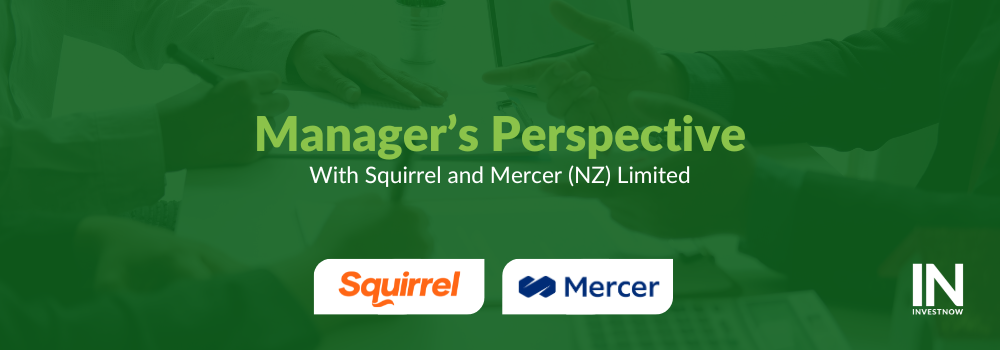
How to Invest with Confidence and Build Financial Resilience in Uncertain Times
Welcome to the August 2025 Manager’s Perspective. Each month, InvestNow invites our investment managers to discuss our monthly theme. This month, we asked Squirrel and Mercer some questions to help you better understand their investment styles, strategies, and perspectives on Financial Resilience. Read the questions and their responses below.
Dave Tyrer
COO
Squirrel


Q1: Sorted’s Money Month notes 44% of Kiwis lack an emergency fund. What’s your advice for someone starting from scratch to build a 3-6 month emergency fund, and can they still do this whilst having an eye towards investing for the future?
The first step – obvious as it might sound – is working out how much of a buffer you want to have in place. That can look very different for different people, depending on your personal situation and level of risk tolerance. If you’re a contractor, for example, where your income can stop at relatively short notice, you might want to have a bit more squirreled away. If you’ve got a steady, salaried job, you might be comfortable with that fund being a bit smaller.
Then, you’ll need to decide where you’re going to put your money. At the very least, make sure it’s going into an interest-earning account, so it’s not just sitting there doing nothing.
Beyond that, the type of savings product that’s going to work best for you will really depend on your personality and circumstances. For some people, having real-time access to their savings is important – although you’ll need a good level of discipline, so you’re not tempted to dip into those funds unless you really need to. With other products – like notice saver accounts and the Squirrel Monthly Income Fund – you’ll need to give several weeks’ or months’ notice in order to withdraw funds, but you’ll generally earn a better interest rate. Some people find that a mix of the two works really well, meaning you’ve got some money on-call and some that’s less readily accessible.
The final step is to automate your saving habits as much as possible. Set up an automatic payment to your savings account/s, which goes out either on the day you get paid, or the next day, so you don’t have to think about it.
Once you’ve got that emergency fund established – giving you some comfort and security around your immediate financial future – then I’d start looking at other opportunities to invest for the longer-term.
Q2: How do you define financial resilience for everyday Kiwis, and what does a resilient investment portfolio look like in practice? How can the investment industry support people in achieving both personal and portfolio-level resilience?
Financial resilience means having enough money tucked away so that you can handle life’s curveballs and different stages without too much stress. It’s about planning for the unexpected stuff – interest rate hikes, or job losses – and, equally, being prepared for things you know are coming (like retirement or babies).
Building financial resilience into your investment portfolio means being really clear around your tolerance for risk – part of which is logical, part subjective – and then having a strategy in place to manage that.
Typically, that looks like having different buckets for different financial goals and choosing your spread of investments (and their associated risk profile) accordingly.
On the logical side, it’s all about timeframes. As a general rule, the longer you’re investing for, the more risk you can afford to take. If you’ve earmarked funds for something in the near-term, though – like a family holiday, a new car, or a house deposit – you’ll want to invest them somewhere where they’re less likely to fall in value, so you know they’ll be there when you need them. Your risk tolerance will naturally be lower.
The subjective side comes down to what you’re comfortable with. Some people are naturally much more risk-on, while others are more conservative – so that’s going to dictate your options, and inform the kinds of investments you’re willing to consider.
There are a raft of great tools out there to help investors work out their risk profile—including sorted.co.nz and Barefoot Investor (an oldie but still well worth a read for anyone starting out). And of course, don’t be afraid to spend the money to get a financial plan in place by talking to a financial advisor and/or leveraging online tools to help. Future you will thank you for taking the time to get yourself set up, including seeking advice where you’re unsure.
Q3: Part of being financially resilient is managing the psychological barriers to saving and investing, which can impact financial decision-making. What practical tips do you have for retail investors to maintain disciplined investment habits?
The big one is to automate things as much as possible. Get those automatic payments set up. When you’re not having to manually transfer funds into your different investment buckets every pay day – you’ve essentially taken yourself out of the process – it’s much easier to keep up good habits.
The other would be that if you come into money – an inheritance, a bonus, a Lotto win (wouldn’t that be nice) – don’t rush the decision around what to do with it. Take a few days – weeks, if you need to – to assess where you’re at financially, where you’d like to be, and how that money could help get you there.
Last but not least, make sure you’re honest with yourself on your investment risk profile. If you can’t handle the downside that can come with higher risk, then dial back your appetite.
Disclaimer: The opinions expressed in this article should not be taken as financial advice, or a recommendation of any financial product. Squirrel shall not be liable or responsible for any information, omissions, or errors present. Any commentary provided are the personal views of the author and are not necessarily representative of the views and opinions of Squirrel. We recommend seeking professional investment and/or mortgage advice before taking any action. To view Squirrel’s disclosure statements and other legal information, please visit our Legal Agreements page here. Past performance is not necessarily indicative of future performance and there is no guarantee that any investor will receive a return on their investment.
Sarah Whitelock
Consumer Wealth Leader
Mercer (NZ) Limited


Q1: Sorted’s Money Month notes 44% of Kiwis lack an emergency fund. What’s your advice for someone starting from scratch to build a 3-6 month emergency fund, and can they still do this whilst having an eye towards investing for the future?
An emergency fund is an important safety net that can help when you have an unexpected expense or drop in revenue. It can also protect you from having to access investments, if you have them, potentially at a loss when the unexpected happens.
While it can feel overwhelming to think about putting extra money aside, starting small and being consistent can build a financial buffer relatively quickly. Setting up an automatic transfer of a small amount to your savings account on pay day is a great way to get your emergency fund off to a good start. To build your emergency fund, initially aim for three months of essential expenses and incrementally build towards a six-month buffer.
If possible, build your emergency fund and investments at the same time, if that is unachievable, focus on the emergency fund. If you’re fortunate to come into extra money, such as bonuses or tax refunds, you can also use this to give your emergency fund a boost. If you have your emergency fund sorted you can direct any extra money into investments, like KiwiSaver.
These small steps can give you peace of mind to invest with greater confidence knowing your expenses are covered when life throws the unexpected your way.
Q2: How do you define financial resilience for everyday Kiwis, and what does a resilient investment portfolio look like in practice? How can the investment industry support people in achieving both personal and portfolio-level resilience?
Financial resilience is about being able to handle life’s surprises, whether it is an unexpected bill or a downturn in the markets, without losing your footing or giving up on your goals.
Building financial resilience starts with your emergency fund, and, if you’re an investor, having a diverse investment portfolio with a mix of different types of assets that match how much risk you’re comfortable with. Regular reviews to check your portfolio lines up with your goals and focusing on steady, long-term growth instead of chasing quick wins are also practical ways to build your financial resilience.
The investment industry has a responsibility to help clients build their financial literacy by making financial education accessible and easy to understand. This includes explaining risk, how markets work, and the importance of diversification. Education supports personal resilience by helping people cut through the noise of short-term fluctuations and possible balance dips, and avoid potentially harmful knee-jerk reactions by keeping a focus on long-term goals and results. Education should also be supported by advice that reflects each person’s unique goals and circumstances. Mercer provides its members with free financial education and a range of user-friendly online tools, such as the Retirement Income Simulator and Fund Selector, to help with retirement planning.
Q3: Part of being financially resilient is managing the psychological barriers to saving and investing, which can impact financial decision-making. What practical tips do you have for retail investors to maintain disciplined investment habits?
The psychological side of investments and saving is often the hardest part. It is not just about the numbers; it is about the habits and mindset that keep you on track.
An effective step to help build a stronger money mindset is by automating your savings and investments. As well as setting aside a small amount for your emergency fund, automating an extra contribution to your KiwiSaver account or other fund can make a surprising difference to your balance over time. The most important thing is to get started.
Limiting your exposure to constant market news, especially when markets are falling, can help manage stress and uncertainty. Similarly, checking your KiwiSaver balance every day can cause unnecessary stress and lead to impulsive decisions.
Speaking with an appropriately authorised financial advisor is a great way to help build disciplined investment habits. They’re trained financial professionals who can help you toward reaching your financial goals and navigating market uncertainty and volatility.
At the end of the day, investing is about discipline and consistency, not quick wins. Building strong habits and sticking with them through market ups and downs is what will help set you up for long-term financial resilience.
Disclaimer: Any advice contained herein is of a general nature only and does not take into account the personal objectives, financial situation or needs of individual investors. It is important that you consider these matters, read the relevant Product Disclosure Statement for any product you are considering, and obtain advice from an appropriately qualified financial adviser before making any investment decision.
Disclaimer
The following commentaries represent only the opinions of the authors. Any views expressed are provided for information purposes only and should not be construed in any way as an offer, an endorsement or inducement to invest. All material presented is believed to be reliable but we cannot attest to its accuracy. Opinions expressed in these reports may change without prior notice.
This article is made available by InvestNow Savings and Investment Service Limited (“InvestNow”). The information and any opinions in this publication are based on sources that InvestNow believes are reliable and accurate. InvestNow, its directors, officers and employees make no representations or warranties of any kind as to the accuracy or completeness of the information contained in this publication and disclaim liability for any loss, damage, cost or expense that may arise from any reliance on the information or any opinions, conclusions or recommendations contained in it, whether that loss or damage is caused by any fault or negligence on the part of InvestNow, or otherwise, except for any statutory liability which cannot be excluded. All opinions and market commentary reflect InvestNow’s judgment on the date of this publication and are subject to change without notice. This disclaimer extends to any entity that may distribute this publication. The information in this publication is not intended to be financial advice for the purposes of the Financial Markets Conduct Act 2013, as amended by the Financial Services Legislation Amendment Act 2019. In particular, in preparing this document, InvestNow did not take into account the investment objectives, financial situation and particular needs of any particular person. Professional investment advice from an appropriately qualified adviser is recommended before making any investment decision. All investments involve risk.

Leave A Comment